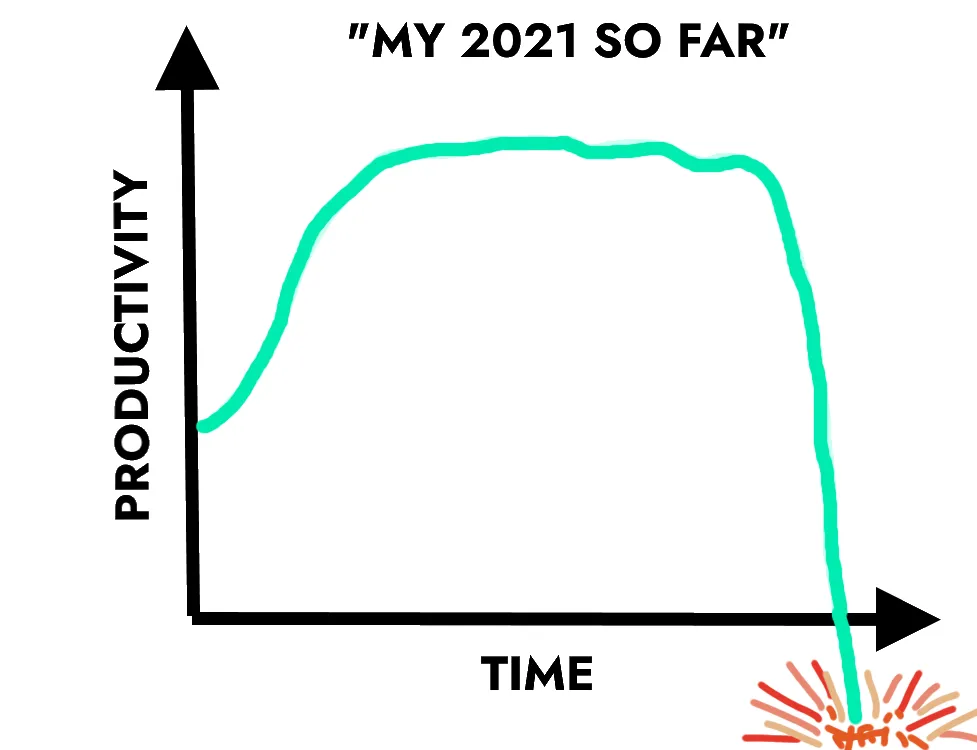Anatomy of a Failed Month
Not every month can be great, but last month was a total disaster.
4 Jul 2022

Not every month can be great, but last year I had one which was a total disaster. They say a picture tells a thousand words:

After adapting to a national lockdown in January, I found a great productive rhythm. But last month everything went wrong simultaneously. Let’s look back and analyze what happened.
I Know What I Didn’t Do That Summer…
First off, my complete derailment wasn’t due to lack of effort. Every day, I made a list of what I’d like to get done. After that, I even actually attempted the things on the list. (Actually attempting tasks is the One Weird Trick beloved by productivity experts everywhere.)
But I never got very far. I’d rapidly become stuck, or I’d delete my own progress, or I’d question if I ought to be doing something else. Or I’d be distracted by something fun, or derailed by something terrible, or so demoralized by the growing sense of accumulated wasted time that I’d waste more time ruminating about it. Suddenly, an entire month had passed, and I was unable to point to any particularly useful achievements.
Seasons like this come and go, but this period felt inescapable. I began to despair that I’d never achieve anything again—which seems over-dramatic now, but appeared reasonable at the time.
With the clarity of hindsight, I can now list the factors which combined to keep me stuck. Any few of these would be solvable, but all of them together were paralyzing:
-
Neglecting my physical needs
-
Not balancing my time
-
Location stagnation
-
Using fun activities to escape work, instead of as a reward for work
-
External problems (bad news, personal dramas, plagues of insects, other)
-
Lack of prioritization—all tasks appeared equally important, so beginning any task led to questioning whether I should be doing that task or something else
The combination of these factors left me drained—too drained to fix any of them individually—creating a cycle which was difficult to escape. Getting even one of these factors right could have given me enough energy to fix the others, so let’s examine them one at a time, simplest first.
Meeting my physical needs
I know I function better when I get enough sleep, exercise, meditation, quality food and social time. Unfortunately, my application of said knowledge is unreliable. I tend to briefly remember how important these things are, practice excellent balance for awhile, then get derailed, develop terrible habits again, and eventually be reminded once more. Then, the cycle begins anew!
My plan for addressing this pattern is to make the cycle so rapid that I’m effectively in a constant state of “being reminded,” meaning I’ll always look after myself pretty well. Basically, my rule is that as soon as I notice I’m failing, I have to take a small action to remedy it. For example, if I think a thought like I’ve not eaten well lately, then—instead of beating myself up—I have to plan a single better-balanced meal. Or if I think I’ve not been active for a while, I have to schedule a walk or a workout. This way, I (theoretically) avoid spiraling into guilt, making periods of bad habits shorter.
Balancing my time
During my failed month, I recognized that things needed to change. But I didn’t effectively change anything. My attempts to “alter my routine” consisted of sitting at the computer and attempting to work on something different—which not only didn’t help, it actively made things worse.
I needed genuine variety; whether something differently productive like cleaning, or exercise, or social time, or actually-restful rest. If something’s not working, working it harder won’t work…you know?
Changing my location
Sometimes, I fall into a similar trap: a subconscious belief that “self-care” exclusively entails resting more, rather than being more active. Sometimes, I end up staying home to recharge when going elsewhere for novelty is what I truly need.
My solution is a simple rule: Every day, go somewhere.
This has been harder in times of covid, but it’s never been impossible. Sticking to it would have given me energy to tackle other issues.
Maintaining a healthy relationship with fun
As my failed month went on, I started disappearing into escapism to avoid work, rather than saving fun for afterwards.
To be clear, I don’t believe fun should be purely parcelled out as a reward for productivity. But there’s a difference between doing something genuinely enjoyable and guiltily bingeing a TV series. “Fun” procrastination methods often end up being neither helpful nor actually fun****.
This means there’s an easy problem and a hard problem when it comes to balance.
The easy problem: guiltily consuming something enjoyable while I ought to be working. It’s easy to address because the fun has already gone. If I’m genuinely not enjoying whatever “fun” activity I’m procrastinating with, then I have a simple rule: stop it. Whatever else I do will be an improvement—whether it’s productive, or actually fun, or both.
Then, there’s the harder problem: remaining disciplined when there’s genuine fun to be had. Normally, I don’t struggle with this. It only becomes an obstacle when I’m running low on mental and emotional resources.
When I’m tired, stressed, just received some bad news and haven’t eaten well, it’s infinitely easier to seek escape than to work. The energy required to press play on a YouTube video is almost always available, but the energy required to make progress on a complex project may not be.
Unfortunately, in the moment I may not recognize my reduced capacity. Instead I judge myself as a terrible person, which makes me feel worse and further depletes my minimal energy reserves. This self-judgement makes the gap between the energy I need and the energy I have even greater.
Whenever I find myself thinking “I’m a terrible lazy person,” it’s actually an important clue! I need to use that as a trigger to think, P_erhaps I’m really drained and I need to recharge ASAP_.
Recognizing and processing external problems
This is the big one. The rapid down-slide on the graph was precipitated by a bunch of huge problems appearing at once, which knocked my overall capacity to deal with life down to near zero. I won’t bore you with the details, but suffice it to say that “the global pandemic” has barely cracked my top five in recent months.
Clearly, there’s nothing I can do to prevent the existence of problems. The universe will always generate new ones, and each one eats away at my capacity to manage others. When a bunch appear at once, even taking care of basic needs can be too much effort, which further reduces my capacity. And the cycle deepens from there.
It’s impossible to simply decide not to have problems, but I could certainly avoid wasting capacity on bemoaning their existence. If only this wasn’t happening, I’d have so much more ability to deal with everything else is absolutely true_…_ but thinking it is, itself, a waste of energy.
When so many problems appeared at once, I’d have been better off immediately accepting that they existed—and that they require resources. This admission would have pushed me to build up my resources by doing everything we’ve talked about so far—taking care of my physical needs, changing up my location, and prioritizing genuine fun over escapism.
I can see now that realizing all this required me to address one final facet of my well-being—the factor that underlies all of my other techniques for building capacity.
Prioritization: triage for life
Ironically, one of the few productive moments I managed during this time was participating in a conversation in the Puttyverse about how to prioritize tasks when there are many. The answer I gave was that I have an internal flow chart which helps me to figure out what to do, and it goes something like this:
Immediate physical needs —> Important but boring chores —> Anything truly urgent —> Whichever project seems most exciting to me today —> Boring work —> Everything else
After advocating for this in detail on the internet, I heroically managed to ignore my own advice and spin my wheels in the mud for weeks—until I finally realized that maybe my past self had had a point about the importance of prioritizing.
What went wrong? I never reassessed my priorities when circumstances changed. A batch of new difficulties had appeared, but I attempted to fix them while working on all of the projects I’d already planned, at the same rate I’d expected before the problems surfaced.
A solution for systems-minded people might be to add reprioritization itself into my list of priorities, making the flow chart into something like:
Immediate physical needs —> Check current priorities —> Important but boring chores —> Anything truly urgent —> Whichever project seems most exciting to me today —> Boring work —> Everything else
As silly as it may sound, consciously working through this exact list would have helped me confront my difficult month. I’d have realized sooner that I was taking on too much while my resources were low…and that they were getting lower each day.
A plan for next time
Looking back, the answers all seem so obvious! Look after myself better. Don’t try to do too much, as that risks doing nothing. Don’t keep trying the same thing over and over. Reprioritize.
But if I got in a time machine and told my past self, “You need to go for a walk, mentally reprioritize in the light of changed circumstances, and come home to cook a good meal,” it would have felt like being given yet another thing to do.
So let me distill everything down to the simplest possible system. Next time I recognize this stuck-and-getting-worse spiral, here’s my plan:
-
Scrap the current plan
-
Do something—anything—that provides a temporary recharge
-
Make a new plan from the ashes of the old one
And, hopefully, none of these new plans will need to involve “drawing a graph of crashing failure” ever again.
This article was originally written for Puttylike

Neil Hughes is the author of Walking on Custard & the Meaning of Life, a comical and useful guide to life with anxiety, and The Shop Before Life, a tale about a magical shop which sells human personality traits.
Along with writing more books, he spends his time on standup comedy, speaking about mental health, computer programming, public speaking and everything from music to video games to languages. He struggles to answer the question "so, what do you do?" and is worried that the honest answer is probably "procrastinate."
He would like it if you said hello.